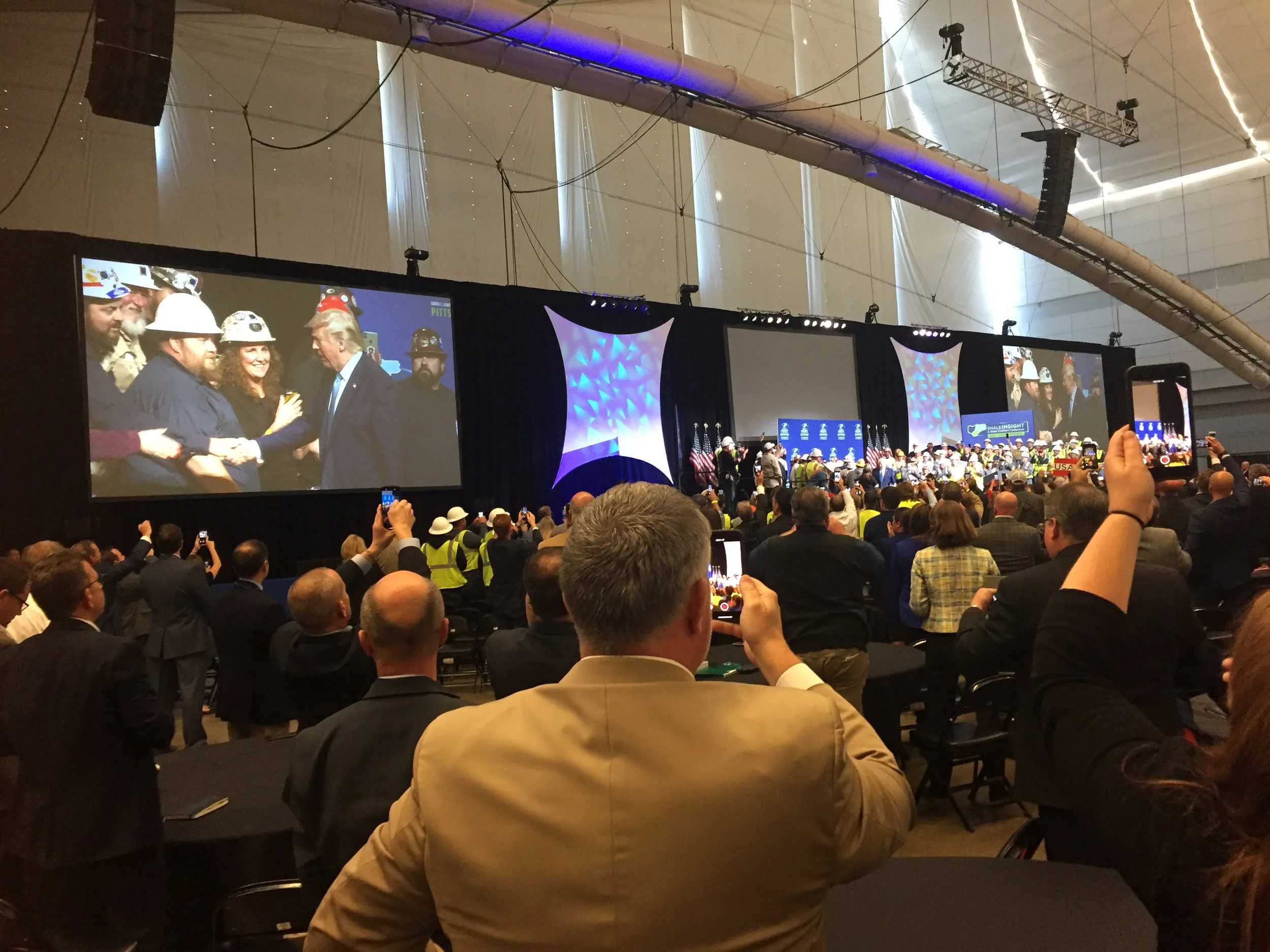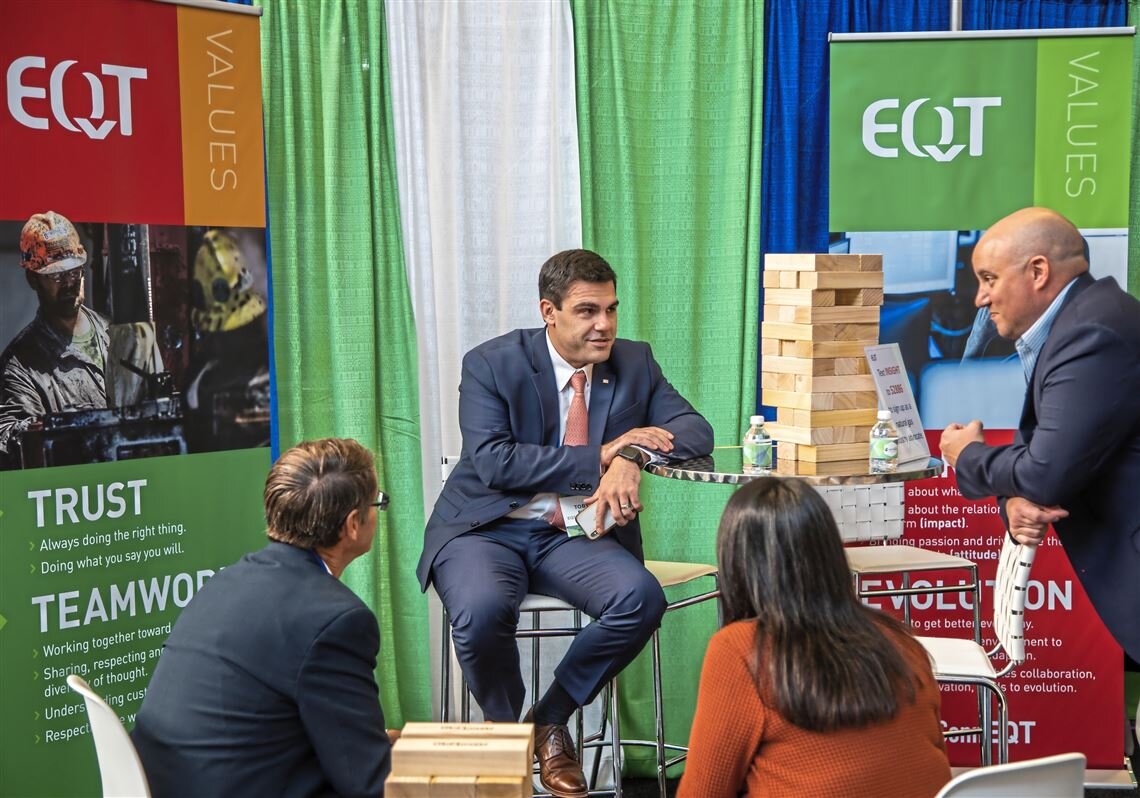On October 23, 2019 I arrived in downtown Pittsburgh. Just down the street, at the same moment, many of my clients were arriving too. I parked my car and walked into the David L. Lawrence Convention Center, a beautiful building with riverfront window that gives you a perfect view of the headwaters of the Ohio River, where my clients gathered. I was there to attend The SHALE INSIGHT Conference, an annual oil and gas industry convention full of the latest and greatest the industry has to offer. Inside those walls were some of the most influential people in the industry and even, this year, the president of the United States, Donald Trump.
Photo: Blue Lens LLC/Mark Dixon
Outside, just down the river my clients stood in solidarity with many other groups representing issues from environmental justice to gender equality and listened to indigenous leaders’ prayers for the waters that their ancestors once called home. They asked, together, for the protection and flourishing of the waters of the Ohio River.
Photo: Andrew Rush/Post-Gazette
Inside, I listened to shale executives, corporate attorneys, and environmental regulators speak about issues considered to be priorities to oil and gas industry leaders. State regulators from Ohio, Pennsylvania, and West Virginia spoke on the need for industry cooperation in plugging of abandoned wells, better performance in pipeline construction and reclamation, and the need for local environments to be left better off than when shale gas development arrived. Regulators repeatedly expressed their gratitude for the oil and gas industry’s presence in their respective states.
Outside, they began marching. Chanting repeatedly about how the oil and gas industry had hurt the things they loved most: their homes, their land, and even their children. They asked, sometimes kindly and sometimes with a little more… enthusiasm for the industry to pack up and go.
Photo: Blue Lens LLC/Mark Dixon
Inside, labor organization leaders spoke on the need for industry to partner with them early on in permitting processes, stating they could help turn out their members to public hearings, and that labor turnout was the best rebuttal to environmental concerns. These organizations also stated they would be friends of the industry in the State House, doing all they could to keep oil and gas development strong in the Appalachian Basin.
Photo: Blue Lens LLC/Mark Dixon
Outside, the members of those very same labor unions rallied with my clients, believing that good jobs and a good environment should go hand in hand. In and interview with Environmental Health News, members pointed to the Sierra Clubs Blue Green Alliance as proof.
Inside, knowledgeable and well-resourced attorneys spoke on legal nuances. Topics like extending the life of oil and gas leases; liability for the plugging of abandoned wells; and the authority of municipalities to address road deterioration, noise, and stormwater management. I listened intently and understood what they were saying: This is where we are vulnerable to the law. This is where everyday people can make things very difficult for us. The attorneys speaking at SHALE INSIGHT 2019 speak the same language as me and the rest of the attorneys at Fair Shake. We are all in the business of understanding and interpreting the law as it stands. We are all in the business of gathering information that supports our clients. We all know that in a battle of interests, the way the law should work is that the person with the law on their side and the evidence on their side wins. And we all know that whether or not the law and the evidence is on your client’s side often comes down to nuances, and those nuances are argued by lawyers.
Outside, the marching crowd peacefully took over Penn Avenue, shutting down traffic just outside of the convention center. They announced proudly that they represented a growing group of individuals who wanted to stand for a better vision of what is possible. Where people were valued more than profits. Where equality was common, and hate had no seat at the table. They announced the start of a coalition called “People Over Petro.”
Photo: Blue Lens LLC/Mark Dixon
The difference between my clients and the clients centered at SHALE INSIGHT, is my clients are the landowners who own the oil and gas being developed, the people who live where the oil and gas is being produced, processed, and transported. More than any operator, my clients need to know the implications of the language of an oil and gas lease; the extent of municipal authority in regulating noise, traffic, road construction and maintenance; and the limits of operator liability, among other topics prioritized by industry attorneys. My clients need to know these things because these things impact their lives—not solely their business, or their finances—but often every aspect of their day to day experience.
This is why I was on the inside with oil and gas executives and their attorneys while my clients were on the outside. Because every person living in the Appalachian Basin has the right to understand the environmental decision-making that determines their lives. More than that, they have a right to meaningfully participate in that decision-making. Industry has armies of lawyers making sure a path is paved for operators to proceed with business as they please. Communities deserve their own armies of lawyers ensuring they too have a path paved that leads toward their own dreams. Right now, there are no armies of lawyers to provide communities with this level of assistance. But there are a handful of us, many working here at Fair Shake.
Photo: Dominion Post
But legal battles are not only fought by attorneys. They are fought with evidence. Inside SHALE INSIGHT, industry leaders listened to experts in noise, air pollution, and geology, among other subjects, explain how to proactively address concerns that might arise at different stages of development and the general cost of taking those proactive steps. Experts explained the importance of collecting baseline data to defend against complaints, to argue for a particular course of action. The exhibitor hall included purveyors of expert services catered to the oil and gas industry’s needs.
Just as every person living in the Appalachian Basin needs legal counsel on the contours of the laws that govern their lives—they need data that confirms their own baselines and experiences, in order to effectively advocate for themselves, or for attorneys like myself to advocate for them. So in addition to the army of lawyers, communities deserve their own armies of experts quantitatively confirming what they already know to be true about their own lived experiences in their Ohio Valley, so they can protect what they love, pursue their own dreams for their communities, and defend their environment when a polluter has other plans for them. We can push for our government agencies to provide those experts and that data, but as regulator statements at SHALE INSIGHT 2019 indicate (and as we see regularly in our work at Fair Shake), the agencies serve two masters—industry and the general population—and industry is coming to the table well equipped to argue their point, and communities must be too.
We at Fair Shake are doing everything we can to provide the legal counsel and connection to the expert resources that is required to ensure the average person’s concerns are taken just as seriously by environmental decisionmakers as the concerns of the target audience of SHALE INSIGHT. Sometimes that means entering into spaces where our clients are often erased or forgotten, including inside the walls of SHALE INSIGHT 2019.















